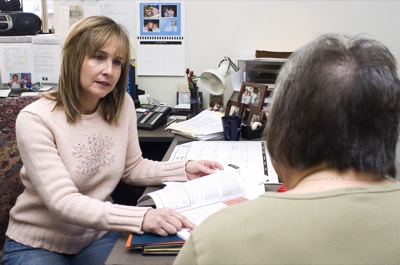Wednesday, January 28th, 2009
Grand Lake area residents remember worse times
By Janie Southard
Rockford resident Hoolie Custer, 94, first heard about the coming Great Depression in 1929 from a buddy who walked up to town from the St. Marys River with a dead muskrat in one hand and a hand axe in the other.
"He asked if I'd learned yet that the stock market crashed. I hadn't, but I sure learned a lot before the Depression was over," says Custer, who was then 15 years old and already a scrappy guy nicknamed Hooligan by his River Rat buddies.
The hard times of the 1930s were barely underway when Custer's parents divorced after his dad was laid off from the railroad. His two older siblings moved out, and Custer, his mother and the younger kids moved in with his grandmother.
"It wasn't easy. Anybody who lived through it would tell you that. I worked on local farms picking fruit and baling hay for $1 a day and never had even a nickel left for candy. If you had a nickel, you bought bread," he says, adding the family had their own garden patch behind the house.
Most women in Rockford worked at the nearby canning factory peeling tomatoes. Local farmers made fuel from corn and would drive their grain to Ohio City if they could make a penny more on the bushel.
"Believe me, if you could make a penny back then, you earned it. Getting by was hard work," Custer says.
Wednesdays and Saturdays used to be big days in Rockford, he says, when everybody went to town to one of the four groceries or three meat markets.
"You'd have to muscle your way down the street back then ... There'd be a weekly drawing at the groceries. You might win a bag of sugar or flour. That was a big attraction," he says.
People also didn't go to town to shop like they do now.
"They went to trade - maybe butter for flour or sugar. And, it wasn't already bagged stuff. They'd dip in the barrel and give you a scoop of dry flour," says Custer, who left Rockford after he graduated from high school (1933) and joined Roosevelt's Civil Conservation Corps, a government work camp for the unemployed.
"Can you imagine. Here I was a boy from Ohio and I ended up in California. Well, it was like a vacation," he says.
The 3-C camp wasn't quite a vacation. It was dawn to dusk hard work. Often the crews had to hike a mile or so just to get to work.
Custer says the current economic troubles aren't quite like the 1930s.
"Well, not yet, but I don't think we've got it all yet ... If it happens, most people will make it through. But the way I look at it, we've raised two generations now who have never really worked a day in their lives. Most have had everything they want given to them," he says. "They'll have to learn to work."
For Custer and for most local countians, the abundance of tillable land and home gardens made a huge difference. City folks didn't typically have the option to raise their own food.
Otterbein St. Marys resident Betty Van Dyke was raised in Detroit. Born there in 1924, she was a youngster during the Depression and says that's just how life was when she was growing up. She didn't know a different life.
Her building contractor father lost jobs and finally lost the family home.
"That was very hard on my dad. He wouldn't accept the (foreclosure) papers, but it didn't matter," Van Dyke says. "My mom cleaned houses and was also a really good cook. Hamburger back then was 3 pounds for 25 cents and she knew a scrillion ways to fix hamburger."
The little girl didn't get much "store-bought" clothes and was happy to get her sisters' and others' hand-me-downs.
"I wasn't ashamed to go to school because so many were in the same boat. But one thing did hurt me. The teacher had to determine whose parents were on welfare and she'd call our names and we'd have to say yes or no. I always wished we wouldn't have to do that," she says.
But the Van Dykes were a loving family and did what they could for the children even if they couldn't keep up with other families who didn't have it quite so bad.
"I never got a Shirley Temple doll like some other girls did. But I had a great big baby doll. I named her Gloria and I still have her today sitting in my living room," Van Dyke adds fondly.
Laura Brewer Duncan, another Otterbein St. Marys resident, was born in 1922 in Crown Point, Ind., one of seven children.
"We didn't get new shoes back then, just new soles that my dad would cut and fit to our shoes. During the Depression, we didn't even have enough money for soles," Duncan recalls.
Her brother Bill's newspaper route helped put food on the table. When he went off to college, she took over his Gary Post Tribune route.
"There were about 150-some on the route, most in town. But there was one farm way down a long, long lane ... One of my customers gave me a box of Christmas ornaments and I was so happy to take those home for the little tree Mom put on the radio cabinet," Duncan says.
"Christmases were bleak. We'd hang up our stockings and somehow Mom managed to find an orange for each of us. She also made our clothes on her old treadle Singer machine ... So many times Mom was reduced to tears. I hated that."
